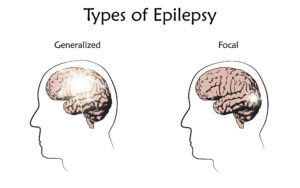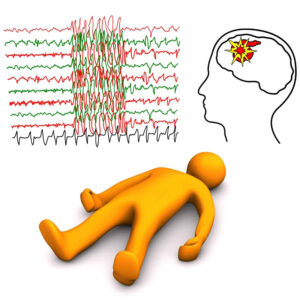What is epilepsy?
Epilepsy is a neurological illness.
The communication between the different parts of the brain occurs through information exchange between billions of neurons present in the brain and makes this fast and continuous communication possible. If at any point in time, there is a glitch in the brain’s electrical activity, then that particular part of the brain or sometimes the whole brain stops working temporarily. This phenomenon is known as Epileptic fit.
Symptoms of epilepsy
The main symptom of epilepsy is seizures. These conditions may occur like loss of consciousness and awareness, convulsions, stiff muscles, blackouts, sudden failing, staring into space, biting the tongue, or loss of bladder or bowel control. It is important to consult a doctor if any of these symptoms occur repeatedly.
Causes of epilepsy
Some of the main causes of epilepsy include head injury that occurred during birth, brain tumor, stroke, brain infection, genetics, alcohol poisoning, drugs, or lack of oxygen during birth.
Types of epilepsy
There are two basic types of epilepsy focal (partial) and generalized epilepsy. The difference between these two types of epilepsy is how and where they begin in the brain.
In generalized epilepsy, seizures are produced by widespread abnormal electric impulses present throughout the entire brain. In focal epilepsy, seizures are produced by electrical impulses that generate from a localized (small) part of the brain.
What to do when you find someone has an epileptic fit?
If someone is having a seizure, it is important to protect them from harming themselves during the fit. Clear away any potentially dangerous objects near them. Don’t restrain or move them. Note the time when the seizure started and how long it lasts. Protect their head by putting something soft underneath or around them.
Once the seizure has stopped, open the airway, check their breathing, and put them in the recovery position.
How to improve the condition of epilepsy’s patient at home?
Epilepsy patients’ have to be cautious about 2-3 things while taking the therapy. For a specified period of time, the patient should avoid driving, swimming, and alone going to heights. Avoid drugs and alcohol. Get plenty of sleep every night. Avoid bright lights and watching TV for a long time. Taking medication as prescribed by a neurologist can help them curing epilepsy.
When to visit a neurologist?
Epilepsy can start at any age but is most commonly diagnosed in people under 20 and over 65. You need to consult a doctor immediately in case of seizures. It is always advisable to receive immediate medical attention from people suffering from illness of the brain.



